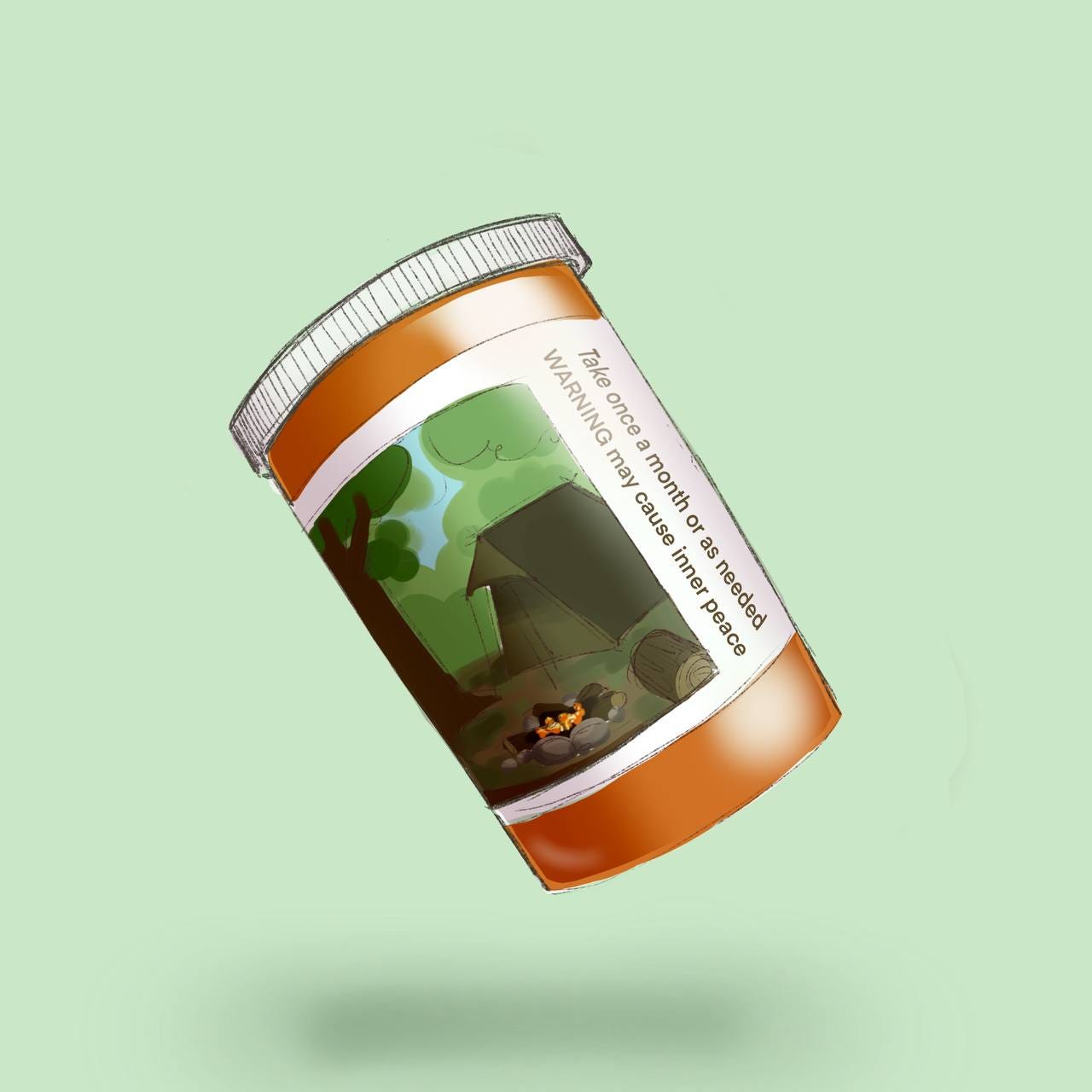Camping, alone: one time monthly or as needed
Doing no-thing

Drawing by Tamila Benabdallah
Camping in the heart of the wild, alone and without any human noises is becoming my reprieve of choice when my mind is overwhelmed and chaotic. Alone and silent as a hermit, away from the buzzing of civilization, I can feel my being melting into a calm abiding rest. Breaking away from habits like coffee and screens is, in my opinion, a fundamentally important reset. In time, if left unchecked, habits consume more than they are consumed. It shifts from deliberation to impulsivity. Only when I can meter the intake there is true enjoyment. The rhythm of excessive behaviour is analogous to hungry ghosts in Tibetan Buddhism, it brings the animalistic side of us at the forefront of what we express. However, if we’re able to stop the transition in progress, we can rollback its effects too. One way I know how to do that is by the simple act of being in the forest, alone, without spoken language. The sensitivity of my ears to manmade noises is why the forest is my go-to. Nothing in particular has to happen for the point is absolute immersion. Walking, climbing trees, making a fire, dipping bare nakedly in icy waters. There is nobody that watches you, there is no desire nor need for an ego for there is nobody to act for.
It is highly probable, however, especially if that is a new activity for you, that you feel an incredibly strong itch to distract yourself. In the forest, there is nothing to grasp for your mind to escape the here and now. Just focus your mind on something, like the tip of the flames from the fire that you’ve made, or the peculiar patterns in the unassuming waterfall close-by. It is inevitable that your mind will deviate towards what you’re used to; distraction through entertainment. The mind, left by itself without any object of focus, will wander aimlessly into the abyss of perpetual and impulsive thoughts. Yes, those thoughts. The ones that you don’t deliberately choose to think of. They just appear and disappear in quick succession, on their own. What are those thoughts anyways? Where do they come from? Why are they of a certain kind and not of other kinds? Are those thoughts You or do You have thoughts? Well, that’s something you have to find out for yourself. Why should anyone want to answer those questions? I, personally believe that without knowing the characteristics of thoughts, we become slaves to them. They control our behaviours for we think they are us. It can be argued both ways; yes they are us and no they aren’t. It depends on the viewing angle. Throughout our lives, we accumulate file cabinets filled with thoughts. We access those thoughts in discussion, debates and generally as our means of shaping the way we see the world. However, we can also see it from a different perspective, whereas, there is a being and there is thought. The being is, in some way, the base layer onto which thoughts are stacked upon. The being is therefore the foundation. It experiences thoughts by the intermediary of the mind. Therefore, the world can be experienced without thoughts since thoughts aren’t the being.
"The sound of the rain needs no translation"
- Zen proverb
When I’m walking in the forest by myself, there are many experiences happening simultaneously, many of which do not go by the intermediary of thoughts. Being completely attentive to the song of the birds in the trees above you does not require any thoughts to be enjoyed, nor is the smell of the pine needles bed you walk on, or the wind that gently caresses your face. To be fully in this moment and to rest truly, you have to be out of your mind. The forest does that for me.
